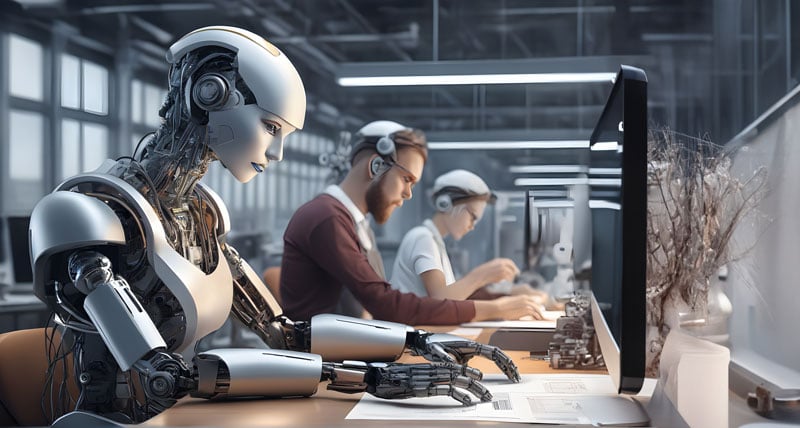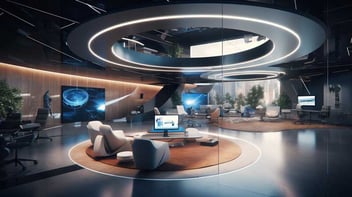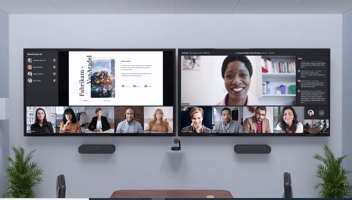
How will Ai impact the future of workplaces?

The integration of Artificial Intelligence (Ai) is ushering in a transformative era for workplaces, reshaping how tasks are approached, collaborations unfold, and innovations take shape. This paradigm shift extends beyond mere automation, touching every facet of the professional realm.
In this article, we explore the intricate tapestry of Ai's influence on corporate workplaces, examining its potential to redefine job roles, revolutionise decision-making processes, and create a more agile workforce.
As Ai technologies evolve, workplaces are becoming dynamic ecosystems that adapt to the symbiotic relationship between human intelligence and artificial prowess. We asked Global Workplace Strategist, Dean Rikanovic and Futurist, Anders Sorman- Nilsson, how we'll navigate the challenges, ethical considerations, and exciting possibilities that lie ahead.
How AI Enhances Office Jobs
According to McKinsey latest Global Survey "the current state of Ai confirms the explosive growth of generative Ai tools.". Many agree, Ai is already proving instrumental in enhancing efficiency within office-based tasks, particularly in automating mundane and repetitive activities. According to Futurist Anders Sorman-Nilsson, by leveraging Ai capabilities for such tasks, humans can redirect their focus towards more meaningful, human-centric, and creative responsibilities.
Here are specific areas where AI can save time in the workplace:
- Data Processing: Ai streamlines data entry and processing within clerical and administrative roles, making the management of vast amounts of information more efficient.
- Writing Content: Tools like ChatGPT, Copy Ai, and Hubspot assist with professional writing, improving the quality and efficiency of content creation, including emails and documents.
- Customer Service and Support: Ai-powered chatbots efficiently handle routine customer queries and support tasks, reducing the need for a large human workforce in these roles.
- Financial Services and Accounting: Ai algorithms contribute to tasks like fraud detection, risk assessment, and algorithmic trading, impacting jobs related to manual data analysis and certain financial tasks.
- AI-powered Virtual Assistants: Virtual assistants like Siri, Google Assistant, Alexa, and Cortana handle routine administrative tasks, schedule management, and client communication, allowing humans to focus on more complex work.
- Research Tasks: Ai-powered tools with Natural Language Processing analyze documents quickly, making research more efficient and comprehensive.
As Ai becomes embedded in our daily work lives reducing time on tasks and even eliminating some of them, how will we spend our time at work in the future?
The Future Workplace: A Blend of Human and Ai
As Ai continues to evolve, corporate offices face the challenge of redefining their purpose, and getting their team back to the office. Global Workplace Strategist, Dean Rikanovic, reports that for some companies, this can feel as challenging as going "back to the moon". With the rise of remote and hybrid work, the future workplace will be a space where humans connect, collaborate, innovate, and find purpose. While AI improves task efficiency, it cannot replace the human side of work, including creativity, collaboration, and camaraderie. Dean, suggests that in order for workplaces to prepare for the Ai driven future, they should embody these characteristics within their workplace strategy.
Characteristics of the Future Workplace:
- Ceremonial: Inclusive experiences that create compelling narratives within the office space.
- Connected: A hybrid environment with intuitive Ai, personalisation, and seamless integration.
- Human: Authentic, real, and compassionate interactions that foster a sense of purpose.
- Multi-functional: An adaptive space that encourages learning, mentoring, and cross-skilling.
- Lean & Green: Light, modular, repurposed, and environmentally conscious, aligning with ESG principles and circular wellness themes.
In conclusion, as Ai reshapes the way we work, the narrative will remain under human control. Future offices will be spaces where tasks focus less on the repetitive and mundane and more on human collaboration, innovation, and creativity. The workplace of tomorrow is not just a physical location; it's a dynamic blend of human potential and artificial intelligence.





